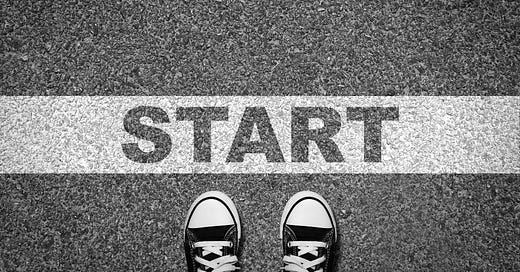Recently, I had the opportunity to interview BJ Fogg on the Elevate Podcast. Fogg is considered one of the world’s leading experts on the subject of habits. He is also the creator of the Fogg Behavior Model (FBM), which states that three elements must converge at the same moment for a behavior to occur: motivation, ability, and a prompt.
While Fogg shared many techniques that can help build good habits and discourage bad ones, one my most important takeaways from our conversation was this: it’s crucial to just get started.
So often, what stands in the way of progress is a combination of inertia, over-thinking and procrastination. This is especially true when we face a larger undertaking; because finishing the task feels impossible, starting it feels like a guarantee of failure.
I happened to have this conversion with Fogg right as I was about to begin training for a sprint triathlon and ramp up my running for the first time this year. In the weeks leading up to the interview with Fogg, I had found myself avoiding doing some of the longer runs that I had planned to kickstart my regimen.
Fogg’s advice encouraged me to change my strategy. For the next month, I did not focus on how far I ran. Instead, I just had to start a run each day, with a minimum of one mile, which was only about a ten-minute commitment. I also kept my running shoes near the door so that I would see them when I walked by and realize how easy it would be for me to put them on and start a run.
Some days, I did run for just one 10-minute mile. But other days, even though I set out to just run a mile or two, I ended up running several more once I got started and was feeling good. I also started each run with a little fist pump to celebrate getting started and create a positive feedback loop, per Fogg’s recommendation.
Why I Moved My Writing To Substack
Recently, I made the decision to move the substantial majority of my writing to Substack. This includes my popular Friday Forward newsletter, which has over 100,000 direct subscribers in sixty countries, after eight years of sending it through the same email partner.
In the end, I ended up running 30 days straight for the first time ever and saw noticeable changes in my running, cardio and health statistics. On balance, I also believe I built up more endurance over the shorter distances through consistency of habit. Had I committed to run a long distance every day, I wouldn’t have made the same progress, as there would have been many days where would’ve felt daunted by the task and skipped running altogether.
As I thought about my little experiment, it made me realize how often we can probably accomplish more by just committing to starting, rather than focusing on the bigger goal. Here are a few examples:
Reading: Instead of thinking about finishing an entire book, just commit to reading a few pages each day.
Managing tasks: Rather than being overwhelmed by the number of things on your to do list, just start at the top and knock off one or two.
Breaking a bad habit: Focus on stopping the bad habit for just one day, rather than wondering how you’ll stop completely.
Starting a fitness routine: Instead of aiming to work out for an hour each day, work out for just 10 minutes at first.
Saving money: Instead of setting a large savings goal, start by putting away a small amount regularly.
Starting a side hustle: Instead of planning a full-fledged business, identify a product or service you can offer today and focus on getting your first customer.
Meditation: Rather than aiming for a lengthy meditation session, meditate for just five minutes each day.
Committing to just starting almost always leads to a better outcome. Once we are over the hump, it’s often easier than we expect to just keep going. The law of inertia cuts both ways—people at rest tend to stay at rest, but people who are in motion tend to stay in motion too.
To return to the Fogg Behavior Model, simply starting gives us the prompt we need to combine with our motivation and ability. Embracing the simplicity of just starting enables us to better overcome daunting hurdles, embrace consistency, and unlock our potential for achievement in many aspects of life and leadership.
Quote of The Week
"The journey of a thousand miles begins with a single step" - Lao Tzu
Have a great weekend!





Like you said, finishing the task feels impossible, starting it feels like a guarantee of failure. I have felt this personally too. Also, inertia works both ways. A particular thing which I felt lazy to start, now that I do it everyday I don't feel like stopping it even one day.
Thank you for this article, Robert!
Just get started.
However small that first step it build momentum.
Robert talks about how he started running. Literally one step at a time.
Most of us are building out our newsletters in public. Testing new ideas and subjects but it all started with one single post and look how far you've come.
Keep going and good things will happen.